Maiden voyage: A warts-and-all look at the debut sailing of northern Labrador's newest ferry
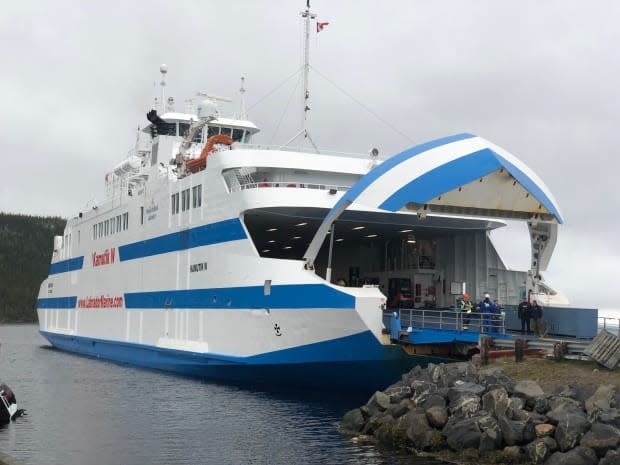
Everyone's waiting for the Kamutik W, the brand new ferry that will be plying the waters of Labrador's northern coast, to get rolling.
The vessel had just arrived from Norway a few days earlier — and two weeks later than expected. The vessel had to be certified for Canadian waters, and that meant a wait.
On this July day at the pier in Happy Valley-Goose Bay, there's another wait. The vessel is hours behind schedule, and loading is taking a while.
Finally, a burst of movement.
"Oh that's the first one?" Mel Woodward, vice-president of marketing for the Woodward Group of Companies, said as the first vehicle rolled onto the new ship.
"Keep 'em coming."
As Labrador Marine put its service into Labrador northern waters, I got a chance to get a peek behind the curtain as the vessel made its maiden voyage up the coast. It was an opportunity to not only check out a critical service in northern Labrador, but to meet people who keep it running — and those who depend on it.
The ship and its crew know they shoulder a big responsibility, serving the people of Nunatsiavut — the Inuit-owned land of northern Labrador — as well as the Innu coastal community of Natuashish. With no road access, the vessel is a lifeline for these communities, providing affordable passenger and cargo service.
"We take a lot of pride in what we do and I'm very happy to be a part of helping communities on the coast get their deliveries and stuff like that," said bosun William Walsh.
"I'm really happy to be a part of this whole operation," said Walsh, who had just finished loading and tying down the first cargo destined for the coast.

"There's always a bit of hiccups especially with the first time, but we're getting it straightened out. I'm sure next time we'll be a little bit faster," Walsh said. "A little bit of swearing going on but we've got it."
David Pottle and Kenneth Best were waiting patiently in the first passenger vehicle to be loaded. With a boat on the back, they were headed to Rigolet for a fishing trip.
"I know people are curious [about] the outcome, but other than that, we have to find out what she's like on the water when there's a heavy sea," said Pottle.
"You're not going to satisfy everybody. It'll be my first time on her and I'll see how good it is," Best said.
The Kamutik W's debut sailing also marks the first time that people in northern Labrador will be able to move along with their vehicles up the coast.
"It's convenient," Pottle said. "You can load what you want in your truck and you can take it, get off and get supplies [or] put it on the truck and go."
A tight squeeze
When the boat finally gets going, Bryan Rich and his family of four from Natuashish get settled into their economy cabin.
"Not too bad. It's kind of small for four people, but it'll do," Rich said.
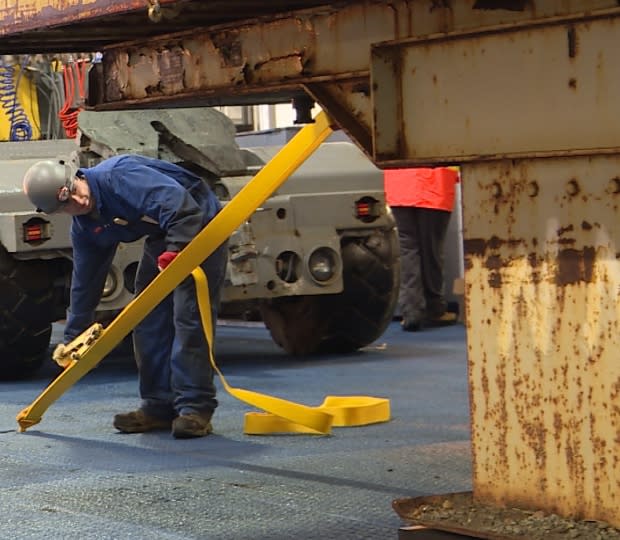
Rich brought his family aboard, as well as two trucks. He says while it's great to have that kind of access into and out of Natuashish, it means changes for his community — including a busy period for police, he said, who will be ticketing non-registered vehicles.
Aboard the ship, there are discussions about about the pros and the cons of the new vessel. Rigolet resident Kristy Sheppard senses history: she's asking everyone to sign the book she's reading.
"It just seemed appropriate that we would mark it … Everyone's excited in different ways to be aboard and I just thought that was a nice record."

Special ramps, made to order
As the ship approached Rigolet, the ship's captain — because of unique tidal patterns in the area — opted to wait until sunlight to dock.
While the Kamutik W itself was retrofitted with longer ramps to handle different tidal conditions, work was still being completed on several of the docking facilities in the communities the ship will serve. In Rigolet, concrete still needed to be poured.

"These ramps were designed specifically for these ships. We built up these shore facilities and everything's been working excellently," said Adam Sparkes, a second officer.
"We came in almost high tide and everything went off without a hitch."
Roll on, roll off service — or ro-ro, as it's called in the ferry business — became a long-awaited reality for Labrador's north coast as vehicles came off the ship in Rigolet.
For Jason Webber, it meant finally bringing his red Ford F-150 into the community where he lives.
"It's different, it's a lot different. At least you don't have to walk on and walk off now," he said.
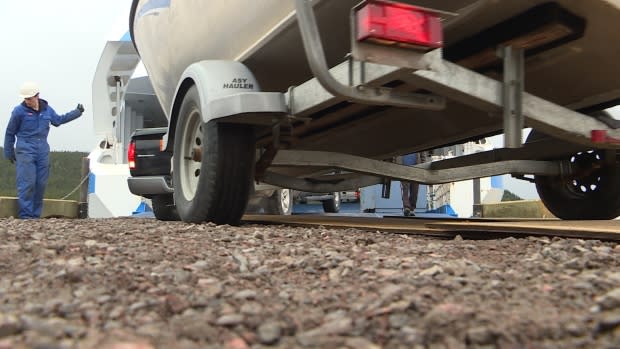
Webber, who is originally from Cartwright, is concerned about communities on the south coast, where the ship service has been scaled back.
"I'd like to it go to Black Tickle and Cartwright and show up in Rigolet on the way, but they don't know that schedule yet either," Webber said.
You have to live here to understand what this freight service means. Everything comes in on the boat. - Toby Andersen
"I'd like to see the ferry go that way so I can just take my family and get on the boat in Rigolet and get off and drive to Spotted [Island]."
Those communities are now being serviced biweekly but the weekend schedule no longer includes Rigolet as a stop.
The province is also providing a boat-plane service in the weeks where the ship isn't running, at the same rates as the ferry.
Change in service, change in costs
The ship's arrival is a relief for Rigolet shopkeeper Sandi Michelin, whose shelves emptied out waiting for the new service.
However, the new ferry comes at a loss — and a price.
"I'm disappointed that we're losing our Lewisporte service because we did get a lot of our merchandise from the island," she said.

The new service completely disrupted the way Michelin got supplies. Having them come through Happy Valley-Goose Bay will be a struggle, she said, and it could mean an increase in prices.
"This is my first lot of goods coming in, so until I get my invoices and see my product, what I have, and then crunch [the] numbers, I do anticipate some increase," she said.
"I'm hoping not too much."
Toby Andersen, a former deputy minister in the Nunatsiavut Government, was riding between Makkovik and Postville and shared his thoughts on the changes to freight service.
"You have to live here to understand what this freight service means," he said.
"Everything comes in on the boat. We already pay the highest prices in the province for food."
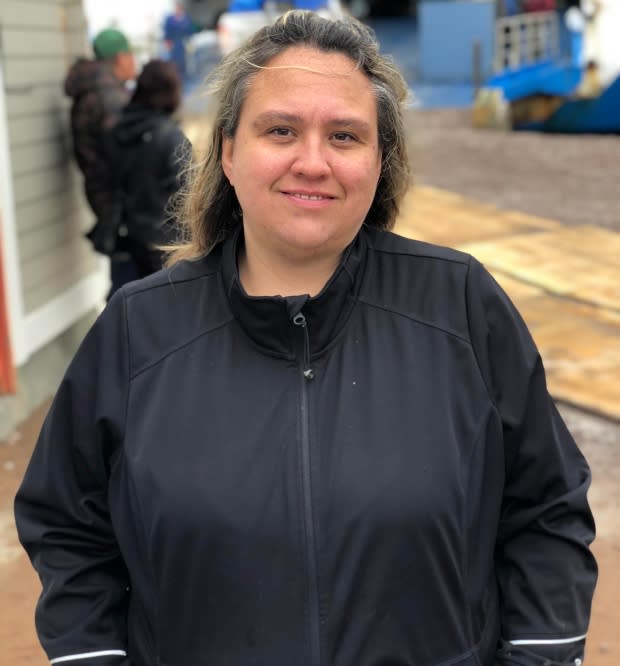
The Newfoundland and Labrador government said that moving cargo through the Goose Bay port will mean cheaper rates, as the Kamutik W can transport more freight. Travelling to the coast weekly instead of once every two weeks will mean fresher produce.
Andersen said many families buy winter supplies from places like Costco, and then ship through Lewisporte.
"That same amount of food now is going to cost $700-$800 just to get it to Goose Bay, [and] then you're going to have to ship it again."
Rockin' and rollin'
As the ship heads around Cape Harrison into the open waters of the Labrador Sea, it becomes a bit harder to walk.
"I thought it was good until the boat was rocking for a good two to three hours," Rahale Obed told me as he was disembarking in Makkovik.
"It was, like, rocking hard where the kitchen was going everywhere and all I can hear is plates."
While that particular part of the run is known to be a bumpy one, many have concerns about how the vessel will fare in harsher conditions.

"When she gets stormy, this thing is going to be tied up more than it's going to be at sea," said Obed. "With the Ranger and Astron, they could handle the tough weather — this one is not going to do it."
But the ship's captain, Austin Daley is no stranger to these waters. He comes to the ship after captaining the MV Astron, which may have made its last journey to the north coast at the beginning of this season.
"It's a learning curve," Daley said.
"Yes, we have a larger vessel but we also have a much more advanced propulsion system ... you have full propulsion in any direction you want."
Tourism opportunities
There are different expectations of the ship among the people on its first voyage. Coastal residents look at every aspect of the vessel, and how it will serve their needs over the years to come.
For the tourists, however, it's a one-off experience
"It's really cold out here and windy — you can tell by my hat," said Marc Begly, who with his wife Jackie O'Leary has come to Labrador from Quebec.
They are seizing every possible opportunity to get out and see the sights along the way. Wind and bumpy waters couldn't hold them back as the ship started making its way through countless icebergs.
"When we spotted them, we came out as fast as we could."

Even with the short time they get on the shore, enough time to offload and load the vessel, visitors try and make the most out of their visits.
Homemade redberry squares and jam — donated by local elder Roberta Edmunds — are served up during the visit, to provide what summer student Emily Broomfield calls an "authentic Labrador tasting experience."
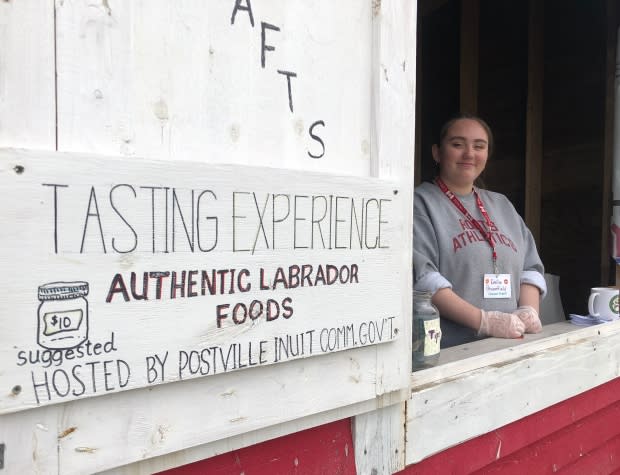
"We have a new boat and we're still expecting tourists … so it would be nice just to have something for them here," Broomfield said.
"The donations [came from] people around town who wanted to help."
'Part of the game'
Later, in Hopedale, the crew is beginning to feel the weight of the hectic first few days of the voyage.
"I think we're all tired but that's part of the game. I think we knew this was going to a challenging week, getting everything on time," said cook Harold Lambert.
"There's so many logistical requirements behind the scenes that nobody sees that need to fall into place."
We got a lot of things to work on but we just got to monitor it. - Austin Daley
There was no purser on this first voyage. The company says it is now hiring one, but for this trip, everyone had to pitch in everywhere to make things work
"We are a ship, right from the captain down to the deck crew, and our purpose is what we set out to do when we set out in Goose Bay," said Lambert.
"And that is to transport passengers and cargo to ports up and down the Labrador coast as safely and efficiently as possible."
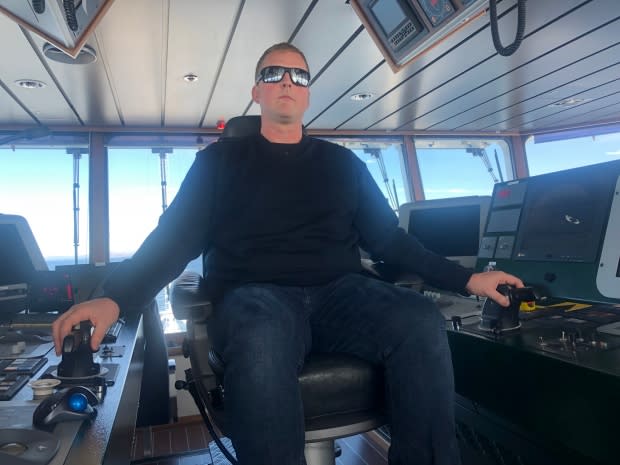
The 12-year contract is worth over $14.5 million a year to the Woodward Group of Companies. The company, which is closely monitoring the opening weeks of the service, says it is ready to deal with any kinks that need to be worked out.
We got a lot of kinks worked out on our way up the coast. So hopefully on the way back down a few more of the kinks will get worked out.
- Harold Lambert
"Things that might seem as a hiccup this trip might just be a one-time thing," said Daley, "so we shouldn't jump the gun."
This trip means a lot to the captain who's been working to get this ship to this point — the first voyage.
"You want to fulfill your job and keep the places stocked with their provisions and do that the best you can."
Last stop: Nain
A trumpet blares as the ship pulls into Nain. A traditional greeting for the arrival of what is also the first ship of the season.
"I was very nervous when it was coming in," trumpet player Eva Obed said.
"Last night, when I went to bed, I couldn't stop thinking about it and couldn't wait to play. I was very nervous."
The last three days have proven to be a long and eventful journey for the passengers and the crew. While not everything had gone according to plan, the ship made it as far North as she goes.
[A] lot of pressure's off now. Now we just gotta make it back down," said Walsh, the deckhand.
And for those in Nain, it brings with it supplies they'd been waiting for and a first glimpse.

"She's here, she's brand new. We can't judge her by her first trip, you know," said Joe Dicker, tbe AngajukKak of Nain. "We'll see how things go."
As fast as the Kamutik W came into port, it heads back out, on the first of what will be many return voyages for a new ship, a new service and a new lifeline for northern Labrador.
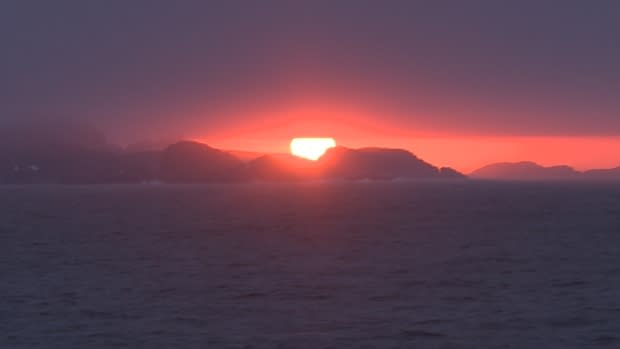
Read more articles from CBC Newfoundland and Labrador


